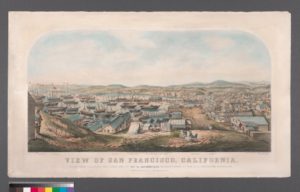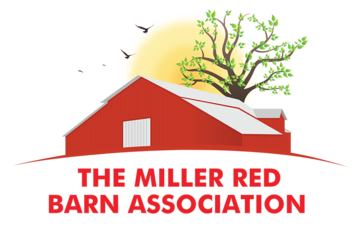Under the eves..Volume 1 Issue 5 Henry Miller starts his wholesale business
 Henry had just arrived in San Francisco…
Henry had just arrived in San Francisco…
It was rough and expensive. The question for Henry at this point was what to do. He had planned to go to the gold fields and make his fortune. However, he could not afford the tools for gold panning. Remember that a shovel was $15-$25, a tin pan was $20, a pair of boots was at least $40, and Henry only had $6 dollars when he arrived. Henry was not dumb. Having experienced the hardships of getting to California and, on landing seeing the price of food and land. Henry realized that if he were going to make his fortune it would not be by panning for gold.
On Henry’s first day in San Francisco, he left the ship and set out to find a job. “I asks a man where is a butcher shop,” he later stated. The man pointed to a shack on a hill near where California and Kearney Streets are today. “I finds a man sitting on a box in front of a lean- to. Flies were buzzing around him. He was reading a newspaper, which had come on the boat. He took no notice of me, so I coughed. When he looked over the top of the papers I says, “I just come on the boat; I am a butcher and wants a job.” He refused Henry, and Henry moved on. Later that day he took a job washing dishes. He had his start.
Henry did not wash dishes very long, and he soon knew the city. He met a man named Edward Barron, who had a butcher shop at the head of Dupont Street (Grant Avenue today). Henry was immediately employed butchering sheep for Barron. He again worked for small wages, as he had in New York, and, to save the price of a room, he slept behind the slaughterhouse. He did his own cooking from the scraps. On occasion, he would splurge and eat at a Chinese restaurant. There, he could get a steak, potato and a cup of coffee for a dollar.
Comments
Tell us what you think about this blog post.
